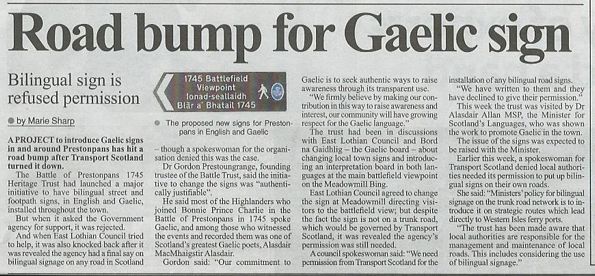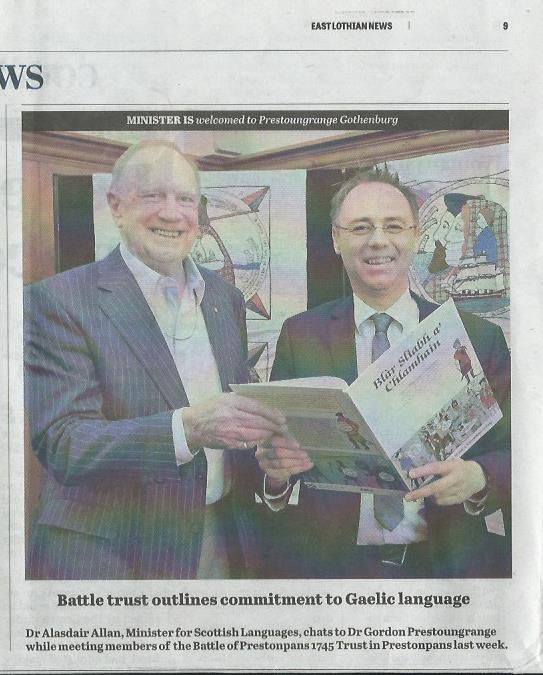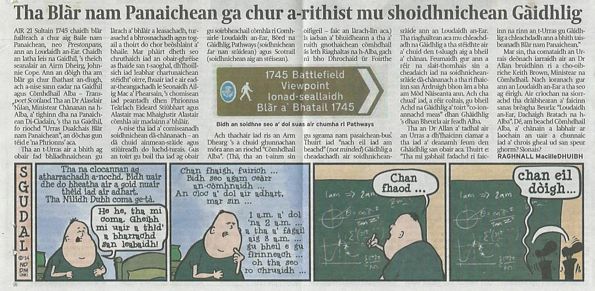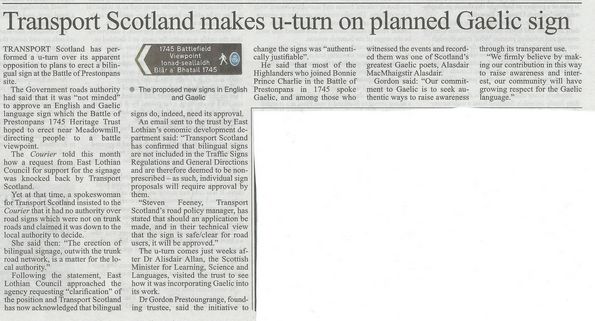What the Papers Say! Gaelic comes to The Pans perhaps ...

... and the Minister [right] duly browsed the text ...


In translation, Ronald Black's piece in The Scotsman reads:
The Battle of Prestonpans is being fought again over Gaelic signs
On 21 Sept. 1745 a bloody battle was fought at Prestonpans in East Lothian. The Highlanders won the day, and the Redcoat general, Johnnie Cope, fled. In a way the battle is still being fought today, but now it's between the Highlanders and Còmhdhail Alba – Transport Scotland. Dr Alasdair Allan, Minister for Scotland's Languages, is coming to the Pans on Wednesday, and the Highlanders, under the disguise of "The Battle of Prestonpans Heritage Trust", are hoping that he will be their Prince.
The Trust have been working for years to develop the battlefield, encourage tourism and boost the town's economy. As part of this they have created the longest tapestry in the world, published a cartoon book based on it, had it translated by John Alick MacPherson, and commissioned a painting of Charles Edward Stuart and Alastair mac Mhaighstir Alastair together on the morning of the battle.
Now they are commissioning Gaelic signs – both street-names and guidance for tourists. To turn them into a reality they are working successfully with East Lothian Council, Bòrd na Gàidhlig, Pathways (off-street signs) and Scotrail (signs at the station).
But they have come up against the Redcoat army and its big guns in the shape of "Còmhdhail Alba". (Yes, that name is official – see their website.) They are the organisation who run transport affairs on behalf of the Scottish Government, everything from the new Forth Bridge to the bus-passes scheme. They have said that they are "not minded" to allow Gaelic on street signs in East Lothian. They have rules about the use of Gaelic which are based on the proportion of the population that speaks the language. It must be by that criterion that they permitted the bilingual street-signs that are to be seen in Airdrie since the time the National Mòd was there. But they haven't heard, it seems, that the Gaelic Language Act gives "parity of esteem" to Gaelic and English throughout Scotland.
Dr Allan is visiting the Trust to see how they make use of Gaelic in their work. He said: "I am looking forward to seeing what the Trust have done to employ Gaelic in interpreting the Battle of Prestonpans."
The Trust's committee is therefore keen to ask Dr Allan to speak to his colleague Keith Brown, the Transport Minister. Isn't it ironic that this has happened in East Lothian. On the county boundaries drivers see a beautiful sign in English: "East Lothian, Home of Scotland's Flag". What, in the view of Còmhdhail Alba, was the language that our heroes spoke when they saw yon white cross in the blue sky? Chinese?
P.S. Following Ronald Black's article in The Scotsman, Steven Feeney of Transport Scotland phoned to clarify the situation as follows:
"I just wanted to clarify the Transport Minister's position ...
"The position of Scottish Ministers is that they support bi-lingual road signs on trunk roads in the traditional Gaelic areas of the north west, and support the phased introduction of bi-lingual signage on the A9 tourist route north (on a replacement basis in line with the A9 widening programme).
"Decisions on any bi-lingual signage beyond that is entirely the remit of the local authority, and the Transport Minister will only be consulted on these local proposals in the rare event if the signs are considered "non-prescribed" (i.e. not in the standard book of road signs)".
Steven hopes that adds clarity and that he's happy to discuss it all further if there are any further queries:
steven.feeney@transportscotland.gsi.gov.uk or 0141 272 7554

.... that sounds as though it's getting clearer ...
Published Date: April 13th 2014
|





